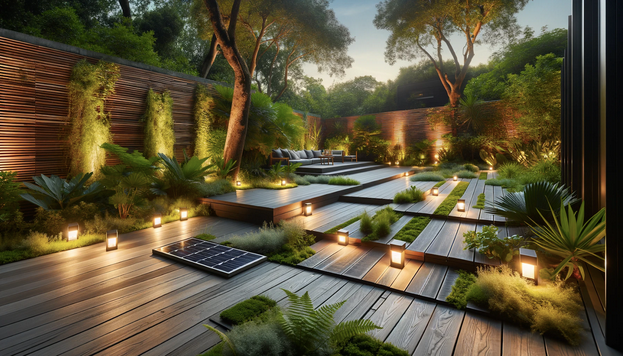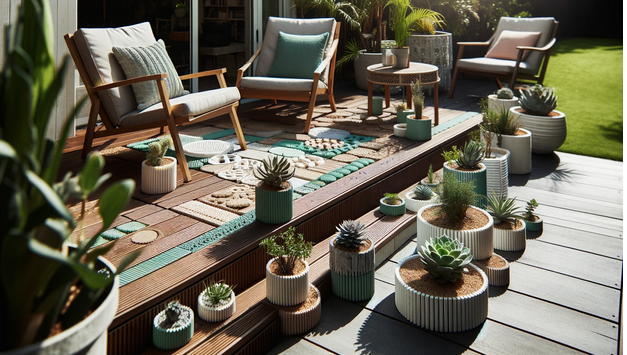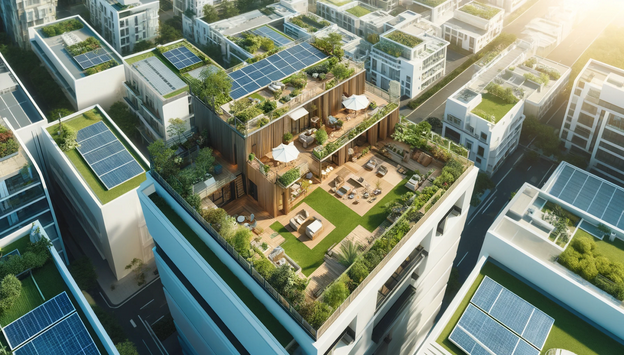In the quest for more sustainable living, homeowners are increasingly turning to eco-friendly solutions that not only enhance their outdoor spaces but also contribute positively to the environment. From patios to decks, the choices made in materials and design can significantly impact the ecological footprint of these projects. One of the most effective ways to ensure an outdoor design is both green and clean is through the integration of eco-friendly materials like eco decking.

The Importance of Choosing Sustainable Materials
When planning an outdoor space, the materials you choose play a pivotal role in its environmental impact and sustainability. Traditional materials for decks and patios, such as conventional wood or concrete, often come with a heavy ecological burden due to their production processes and maintenance requirements.
|
Material Type |
Benefits |
Lifespan |
Maintenance Required |
Environmental Impact |
|
Recycled Plastic |
Water-resistant, durable, rot-proof |
25+ years |
Low |
Minimal |
|
Composite Decking |
High durability, minimal fading |
20+ years |
Moderate |
Low |
|
Bamboo |
Rapidly renewable, strong, aesthetic |
10-20 years |
High |
Very low |
|
Reclaimed Wood |
Unique look, reduces waste |
Varies |
Moderate |
Very low
|
Benefits of Eco-Friendly Materials
Using eco decking and other sustainable materials offers numerous benefits:
- Reduced Environmental Impact: Eco decking is typically made from recycled materials, reducing the demand for virgin resources and minimizing waste.
- Durability and Maintenance: Materials designed for eco decking are not only durable but also require less maintenance than traditional wood decking, which often needs chemical treatments to resist mold, pests, and weather damage.
- Aesthetic Versatility: Modern eco decking comes in various styles and colors, providing flexibility in design while maintaining an environmentally responsible footprint.

Designing with Sustainability in Mind
To truly embrace a greener approach to outdoor design, consider every aspect from water usage to energy efficiency. Here are a few strategies to enhance the sustainability of your outdoor space:
- Water Conservation: Implement a rainwater collection system to irrigate your garden, reducing the need for supplemental water use.
- Solar Lighting: Incorporate solar-powered lights to reduce energy consumption, providing a sustainable and cost-effective lighting solution for your deck or patio.
- Native Plantings: Choose local, drought-resistant plants that thrive in your regional climate. This reduces the need for water, fertilizers, and pesticides.
|
Feature |
Description |
Benefits |
|
Solar Lighting |
Energy-efficient lighting powered by solar panels |
Reduces energy use, cost-effective |
|
Rainwater Harvesting |
Collects and uses rainwater for irrigation |
Conserves water, reduces runoff |
|
Native Plant Landscaping |
Uses plants that are indigenous to the area |
Requires less water and maintenance, enhances local biodiversity |
Sustainable Practices in Outdoor Construction
- Eco-Friendly Foundations: Use permeable pavers for patios and walkways to improve water absorption and reduce runoff.
- Recycled Materials: Opt for furniture and decorative items made from recycled or upcycled materials, which reduces waste and supports a circular economy.
Long-Term Benefits of Eco Decking
Incorporating eco decking in your outdoor design isn't just a temporary trend; it's an investment in the future of your home and the planet. Eco decking provides a durable, low-maintenance surface that lasts longer than traditional materials, offering long-term savings and environmental benefits.
The Impact on Home Value
- Increased Property Value: Homes with eco-friendly installations are becoming increasingly popular among conscious buyers, potentially increasing property values.
- Attractiveness to Buyers: Eco decking and other green features can make your property stand out in the real estate market, attracting buyers interested in sustainability.

Conclusion
Building greener and cleaner isn't just about selecting the right materials; it's about a holistic approach to design that considers the long-term impacts on the environment and on your life. By choosing eco decking, you're not only creating a beautiful outdoor space but also contributing to a more sustainable world. As we move forward, the integration of eco-conscious materials into home design will continue to grow, underscoring the importance of sustainability in our everyday lives.
Our Style Guide



